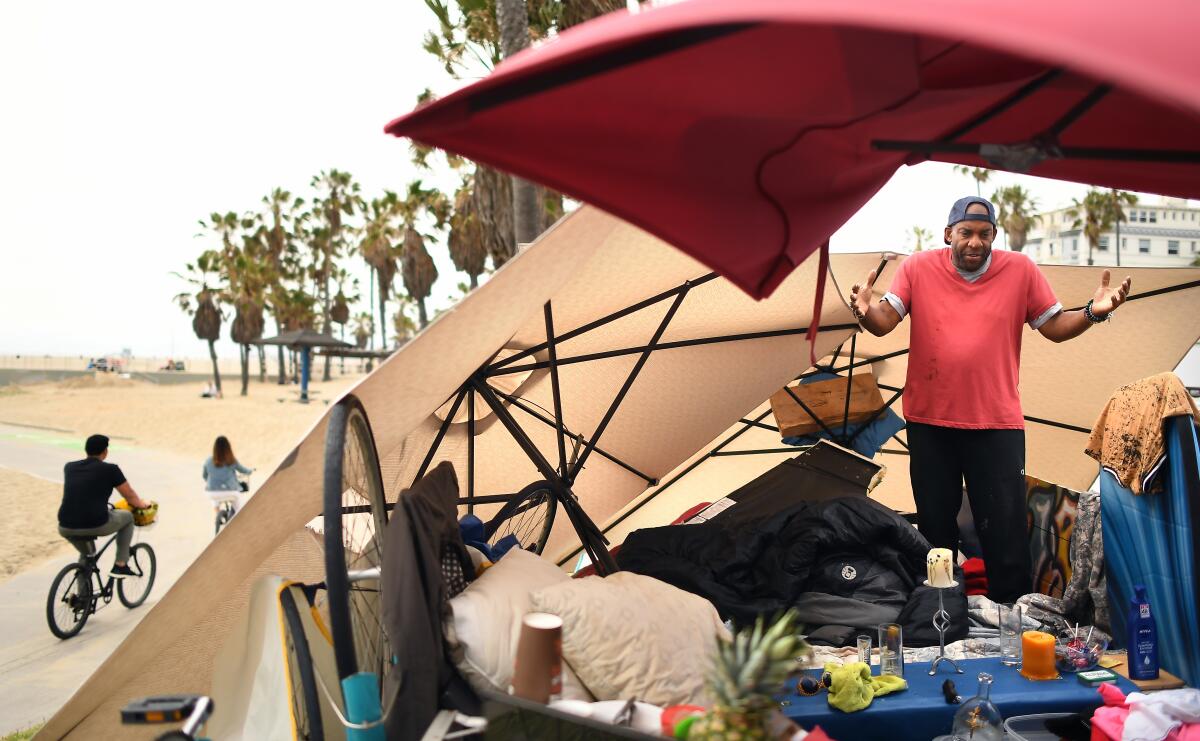Yes, homeless people have rights. Even in Venice

- Share via
This week, the U.S. Supreme Court showed that, among its many talents, it’s pretty damn good at simple calculations: If cities don’t have enough beds to shelter homeless people, then police may not force the homeless off public sidewalks or out of public parks.
Sleeping in parks, in sidewalk tents or on the sand out of desperation is not OK in any moral or ethical sense, but at least for now, it’s legal.
And there was another piece of good news on the humanitarian front last week, this one from the Los Angeles City Council. The council voted 13-0 to approve the opening of a homeless shelter in Venice, a few blocks from the beach. The space, an unused bus yard, will put a roof over the heads of about 154 people. This is part of Mayor Eric Garcetti’s plan to open at least one shelter in all 15 council districts.
I have listened to arguments against the Venice shelter for years: Homeless people should not be allowed to live at the beach, where homes cost millions of dollars. Homeless people should not occupy a prime piece of real estate that could otherwise generate millions of dollars in revenue for some developer.
But homeless people already live at the beach.
And the Venice shelter will be a temporary use of the land. The hope is it will provide a bridge to permanent housing. The bus yard is owned by the MTA, which plans to build affordable housing on the site in three years. (Will some neighbors in their multi-million-dollar homes then argue that affordable housing has no business being next to the beach?) L.A. Councilman Mike Bonin has taken a tremendous amount of heat from his constituents for pushing this plan. L.A. County Supervisor Sheila Kuehl is also a strong backer.
Each time I write in favor of homeless shelters or transitional housing near the beach, I get an earful of indignance. Much of it can be boiled down to this question: Why don’t they all move to the desert, where land is cheap and abundant?
First of all, this is a free country (for now). People can live where they want. Who would choose to live in the high desert, with its unbearably hot summers and unbearably cold winters, when they could sleep on the sand in Venice and rummage through dumpsters in the back of upscale restaurants for food?
Also, why assume that desert cities are more welcoming to homeless people than other, more expensive places?
Last week, in fact, Lancaster showed why homelessness is every bit the divisive issue in the sparsely populated Antelope Valley as it is in urban centers. Of the estimated 59,000 homeless people in Los Angeles County, only about 3,300 live in the entire Antelope Valley.
On Dec. 10, the Lancaster City Council debated whether to pass an ordinance that would put restrictions on how and where homeless people could be fed.
If passed, the law would ban food giveaways on public sidewalks, streets and parking lots. Free food could be handed out in public parks, but only if charitable groups — or individuals — secure park rental and L.A. County health permits.
As you might imagine with such a preposterous proposal, passions ran high.
I watched a video of the meeting for as long as I could stomach it.
It was hard to watch Mayor R. Rex Parris, who ran the meeting like a benevolent despot, patronizing constituents, arbitrarily cutting their speaking time in half, briefly suspending the proceeding when someone booed him.
Parris has previously advised people to carry concealed weapons for protection against homeless people, 60% of whom, he said, are “criminals and thugs.” A few years ago he tried to shut down the Lancaster Metrolink station, accusing Los Angeles of shipping homeless people to the Antelope Valley.
Bringing food to people who shelter under bridges, or in doorways, said Parris, “is a crisis waiting to happen.”
“It already is!” yelled someone in the audience.
“When people defecate on the streets, when they defecate in doorways and especially when they do that in the parks and the children play in that it is unacceptable,” Parris said.
Who in the world would disagree with that?
Unauthorized pooping is a huge problem and a real public health issue, but the answer is not to force good Samaritans to jump through bureaucratic hoops to give a hungry person a peanut butter-and-jelly sandwich. The answer is to provide toilets where they are needed.
Fear of food-borne illness, speakers said, is overblown. Many were church and community volunteers who take food to people who are not mobile.
“I’ve got to go where the need is,” said Pastor David Cowan of Lancaster’s Love and Grace Christian Fellowship Church. “And the need might be up under a bridge, the need might be in a brook, the need may be anywhere. Don’t penalize my people for going to feed people.”
Regina Thomas told the council she spent Thanksgiving driving in the snow to feed homeless people. “I’m not going to stop doing it today,” she said. “Not next week, not next year. So lock me up today!”
City Council members, who seemed taken aback by the crowd’s intensity, tabled the issue for now.
Their pointless exercise has overshadowed some of the positive developments in the city, including the construction of a new, long-overdue complex that will provide permanent and temporary housing for about 300 people.
I hope Parris and his colleagues let this proposal die.
I mean, how does this sound: Welcome to Lancaster. You can sleep under a bridge. You just can’t eat under one?
More to Read
A cure for the common opinion
Get thought-provoking perspectives with our weekly newsletter.
You may occasionally receive promotional content from the Los Angeles Times.










